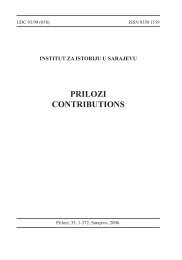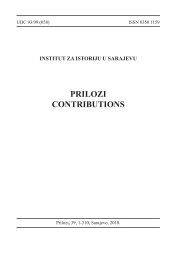- Page 1 and 2:
UDC 93/99 (058) ISSN 0350 1159 INST
- Page 3 and 4:
UDC 93/99 (058) ISSN 0350 1159 Pril
- Page 5 and 6:
UDC 93/99 (058) ISSN 0350 1159 Pril
- Page 7:
Riječ redakcije Prilozi, 36, Saraj
- Page 11 and 12:
Esad Kurtović, Prilog historiji vl
- Page 13 and 14:
Esad Kurtović, Prilog historiji vl
- Page 15 and 16:
Esad Kurtović, Prilog historiji vl
- Page 17 and 18: Esad Kurtović, Prilog historiji vl
- Page 19 and 20: Esad Kurtović, Prilog historiji vl
- Page 21 and 22: Esad Kurtović, Prilog historiji vl
- Page 23 and 24: Esad Kurtović, Prilog historiji vl
- Page 25 and 26: Esad Kurtović, Prilog historiji vl
- Page 27 and 28: Esad Kurtović, Prilog historiji vl
- Page 29 and 30: Esad Kurtović, Prilog historiji vl
- Page 31: Esad Kurtović, Prilog historiji vl
- Page 34 and 35: Hana Younis, Skice porodičnog živ
- Page 36 and 37: Hana Younis, Skice porodičnog živ
- Page 38 and 39: Hana Younis, Skice porodičnog živ
- Page 40 and 41: Hana Younis, Skice porodičnog živ
- Page 42 and 43: Hana Younis, Skice porodičnog živ
- Page 44 and 45: Hana Younis, Skice porodičnog živ
- Page 46 and 47: Hana Younis, Skice porodičnog živ
- Page 48 and 49: Hana Younis, Skice porodičnog živ
- Page 50 and 51: Hana Younis, Skice porodičnog živ
- Page 52 and 53: Hana Younis, Skice porodičnog živ
- Page 54 and 55: Hana Younis, Skice porodičnog živ
- Page 56 and 57: Hana Younis, Skice porodičnog živ
- Page 58 and 59: Hana Younis, Skice porodičnog živ
- Page 60 and 61: Hana Younis, Skice porodičnog živ
- Page 62 and 63: Hana Younis, Skice porodičnog živ
- Page 64 and 65: Hana Younis, Skice porodičnog živ
- Page 66 and 67: Hana Younis, Skice porodičnog živ
- Page 70 and 71: Željko Karaula, Hrvatska (Republik
- Page 72 and 73: Željko Karaula, Hrvatska (Republik
- Page 74 and 75: Željko Karaula, Hrvatska (Republik
- Page 76 and 77: Željko Karaula, Hrvatska (Republik
- Page 78 and 79: Željko Karaula, Hrvatska (Republik
- Page 80 and 81: Željko Karaula, Hrvatska (Republik
- Page 82 and 83: Željko Karaula, Hrvatska (Republik
- Page 84 and 85: Željko Karaula, Hrvatska (Republik
- Page 86 and 87: Željko Karaula, Hrvatska (Republik
- Page 88 and 89: Željko Karaula, Hrvatska (Republik
- Page 90 and 91: Željko Karaula, Hrvatska (Republik
- Page 92 and 93: Željko Karaula, Hrvatska (Republik
- Page 94 and 95: Željko Karaula, Hrvatska (Republik
- Page 96 and 97: Željko Karaula, Hrvatska (Republik
- Page 98 and 99: Adnan Velagić, Obnova i društveni
- Page 100 and 101: Adnan Velagić, Obnova i društveni
- Page 102 and 103: Adnan Velagić, Obnova i društveni
- Page 104 and 105: Adnan Velagić, Obnova i društveni
- Page 106 and 107: Adnan Velagić, Obnova i društveni
- Page 108 and 109: Adnan Velagić, Obnova i društveni
- Page 110 and 111: Adnan Velagić, Obnova i društveni
- Page 112 and 113: Adnan Velagić, Obnova i društveni
- Page 114 and 115: Adnan Velagić, Obnova i društveni
- Page 116 and 117: Adnan Velagić, Obnova i društveni
- Page 118 and 119:
Adnan Velagić, Obnova i društveni
- Page 120 and 121:
Tomislav Išek, Koncepcije osnivač
- Page 122 and 123:
Tomislav Išek, Koncepcije osnivač
- Page 124 and 125:
Tomislav Išek, Koncepcije osnivač
- Page 126 and 127:
Tomislav Išek, Koncepcije osnivač
- Page 128 and 129:
Tomislav Išek, Koncepcije osnivač
- Page 130 and 131:
Tomislav Išek, Koncepcije osnivač
- Page 132 and 133:
Tomislav Išek, Koncepcije osnivač
- Page 135 and 136:
Iljas Hadžibegović, Socijalna str
- Page 137 and 138:
Iljas Hadžibegović, Socijalna str
- Page 139 and 140:
Iljas Hadžibegović, Socijalna str
- Page 141 and 142:
Iljas Hadžibegović, Socijalna str
- Page 143 and 144:
Iljas Hadžibegović, Socijalna str
- Page 145 and 146:
Iljas Hadžibegović, Socijalna str
- Page 147 and 148:
Iljas Hadžibegović, Socijalna str
- Page 149 and 150:
Iljas Hadžibegović, Socijalna str
- Page 151 and 152:
Iljas Hadžibegović, Socijalna str
- Page 153 and 154:
Iljas Hadžibegović, Socijalna str
- Page 155 and 156:
Iljas Hadžibegović, Socijalna str
- Page 157 and 158:
Iljas Hadžibegović, Socijalna str
- Page 159 and 160:
Iljas Hadžibegović, Socijalna str
- Page 161 and 162:
Iljas Hadžibegović, Socijalna str
- Page 163 and 164:
Iljas Hadžibegović, Socijalna str
- Page 165 and 166:
Iljas Hadžibegović, Socijalna str
- Page 167 and 168:
Iljas Hadžibegović, Socijalna str
- Page 169 and 170:
Iljas Hadžibegović, Socijalna str
- Page 171 and 172:
Iljas Hadžibegović, Socijalna str
- Page 173 and 174:
Iljas Hadžibegović, Socijalna str
- Page 175 and 176:
Iljas Hadžibegović, Socijalna str
- Page 177 and 178:
Iljas Hadžibegović, Socijalna str
- Page 179:
HISTORIJSKA GRAĐA
- Page 182 and 183:
Mina Kujović, Prepiska iz 1941. i
- Page 184 and 185:
Mina Kujović, Prepiska iz 1941. i
- Page 186 and 187:
Mina Kujović, Prepiska iz 1941. i
- Page 188 and 189:
Mina Kujović, Prepiska iz 1941. i
- Page 191:
IZLAGANJA SA NUČNIH SKUPOVA
- Page 194 and 195:
Edin Radušić, Stav Islamske zajed
- Page 196 and 197:
Edin Radušić, Stav Islamske zajed
- Page 198 and 199:
Edin Radušić, Stav Islamske zajed
- Page 200 and 201:
Edin Radušić, Stav Islamske zajed
- Page 202 and 203:
Edin Radušić, Stav Islamske zajed
- Page 204 and 205:
Ibrahim Karabegović, Doprinos dr.
- Page 206 and 207:
Ibrahim Karabegović, Doprinos dr.
- Page 209:
PRIKAZI
- Page 212 and 213:
Prikazi Prilozi, 36, Sarajevo, 2007
- Page 214 and 215:
Prikazi Prilozi, 36, Sarajevo, 2007
- Page 216 and 217:
Prikazi Prilozi, 36, Sarajevo, 2007
- Page 218 and 219:
Prikazi Prilozi, 36, Sarajevo, 2007
- Page 220 and 221:
Prikazi Prilozi, 36, Sarajevo, 2007
- Page 222 and 223:
Prikazi Prilozi, 36, Sarajevo, 2007
- Page 224 and 225:
Prikazi Prilozi, 36, Sarajevo, 2007
- Page 226 and 227:
Prikazi Prilozi, 36, Sarajevo, 2007
- Page 228 and 229:
Prikazi Prilozi, 36, Sarajevo, 2007
- Page 230 and 231:
Prikazi Prilozi, 36, Sarajevo, 2007
- Page 232 and 233:
Prikazi Prilozi, 36, Sarajevo, 2007
- Page 234 and 235:
Prikazi Prilozi, 36, Sarajevo, 2007
- Page 236 and 237:
Prikazi Prilozi, 36, Sarajevo, 2007
- Page 238 and 239:
Prikazi Prilozi, 36, Sarajevo, 2007
- Page 240 and 241:
Prikazi Prilozi, 36, Sarajevo, 2007
- Page 242 and 243:
Prikazi Prilozi, 36, Sarajevo, 2007
- Page 244 and 245:
Prikazi Prilozi, 36, Sarajevo, 2007
- Page 246 and 247:
Prikazi Prilozi, 36, Sarajevo, 2007
- Page 248 and 249:
Prikazi Prilozi, 36, Sarajevo, 2007
- Page 250 and 251:
Prikazi Prilozi, 36, Sarajevo, 2007
- Page 252 and 253:
Prikazi Prilozi, 36, Sarajevo, 2007
- Page 254 and 255:
Prikazi Prilozi, 36, Sarajevo, 2007
- Page 256 and 257:
Prikazi Prilozi, 36, Sarajevo, 2007
- Page 258 and 259:
Prikazi Prilozi, 36, Sarajevo, 2007
- Page 260 and 261:
Prikazi Prilozi, 36, Sarajevo, 2007
- Page 262 and 263:
Prikazi Prilozi, 36, Sarajevo, 2007
- Page 264 and 265:
Prikazi Prilozi, 36, Sarajevo, 2007
- Page 266 and 267:
Prikazi Prilozi, 36, Sarajevo, 2007
- Page 268 and 269:
Prikazi Prilozi, 36, Sarajevo, 2007
- Page 270 and 271:
Prikazi Prilozi, 36, Sarajevo, 2007
- Page 272 and 273:
Prikazi Prilozi, 36, Sarajevo, 2007
- Page 274 and 275:
Prikazi Prilozi, 36, Sarajevo, 2007
- Page 276 and 277:
Prikazi Prilozi, 36, Sarajevo, 2007
- Page 278 and 279:
Prikazi Prilozi, 36, Sarajevo, 2007
- Page 280 and 281:
Prikazi Prilozi, 36, Sarajevo, 2007
- Page 282 and 283:
Prikazi Prilozi, 36, Sarajevo, 2007
- Page 284 and 285:
Prikazi Prilozi, 36, Sarajevo, 2007
- Page 286 and 287:
Prikazi Prilozi, 36, Sarajevo, 2007
- Page 288 and 289:
Prikazi Prilozi, 36, Sarajevo, 2007
- Page 290 and 291:
Prikazi Prilozi, 36, Sarajevo, 2007
- Page 292 and 293:
Prikazi Prilozi, 36, Sarajevo, 2007
- Page 294 and 295:
Prikazi Prilozi, 36, Sarajevo, 2007
- Page 296 and 297:
Prikazi Prilozi, 36, Sarajevo, 2007
- Page 298 and 299:
Prikazi Prilozi, 36, Sarajevo, 2007
- Page 300 and 301:
Prikazi Prilozi, 36, Sarajevo, 2007
- Page 302 and 303:
Prikazi Prilozi, 36, Sarajevo, 2007
- Page 305 and 306:
Indeks autora Prilozi, 36, Sarajevo
- Page 307 and 308:
Upute sradnicima Prilozi, 36, Saraj
- Page 309 and 310:
KATALOG IZDANJA INSTITUTA ZA ISTORI
- Page 311 and 312:
KATALOG IZDANJA INSTITUTA ZA ISTORI
- Page 313 and 314:
KATALOG IZDANJA INSTITUTA ZA ISTORI
- Page 315 and 316:
KATALOG IZDANJA INSTITUTA ZA ISTORI
- Page 317 and 318:
KATALOG IZDANJA INSTITUTA ZA ISTORI
- Page 320:
PRILOZI INSTITUT ZA ISTORIJU U SARA






